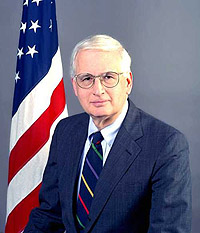James Stapleton Roy (Chinese: 芮效俭; pinyin: Ruì Xiàojiǎn; born June 16, 1935) is a former senior United States diplomat specializing in Asian affairs. A fluent Chinese speaker, Roy spent much of his career in East Asia, where his assignments included twice in Bangkok, Hong Kong, Taipei, and Beijing, once in Singapore, and Jakarta. He also specialize in Soviet affairs, and had served in Moscow at the height of the Cold War. Roy also served as Assistant Secretary of State for Intelligence and Research from 1999 to 2000.
J. Stapleton Roy | |
|---|---|
| 芮效俭 | |
 Official portrait, 1991 | |
| 5th United States Ambassador to China | |
| In office August 20, 1991 – June 17, 1995 | |
| President | George H. W. Bush Bill Clinton |
| Preceded by | James R. Lilley |
| Succeeded by | Jim Sasser |
| 14th Assistant Secretary of State for Intelligence and Research | |
| In office November 19, 1999 – January 13, 2001 | |
| President | Bill Clinton |
| Preceded by | Phyllis E. Oakley |
| Succeeded by | Carl W. Ford Jr. |
| 13th Executive Secretary of the United States Department of State | |
| In office 1989–1991 | |
| Preceded by | Melvyn Levitsky |
| Succeeded by | W. Robert Pearson |
| Personal details | |
| Born | June 16, 1935 Nanking, China |
| Nationality | American |
| Education | Princeton University (BA) |
| Occupation | Diplomat |
Early life and education
editRoy was born in Nanking, China, where his father, Andrew Tod Roy, was a Presbyterian missionary and teacher who stayed on in China until he was denounced by the new government and expelled in 1951. His brother was David Tod Roy, a noted scholar and translator of Chinese literature.[1]
While in Shanghai, Roy attended Shanghai American School, but left China when the school was closed in 1949 following the Communist takeover of Shanghai. He attended Mount Hermon School (now Northfield Mount Hermon) and Princeton University, where he was elected to Phi Beta Kappa and graduated magna cum laude with a Bachelor of Arts degree in history in 1956 after completing a senior thesis titled "The Revisionists and the Coming of the War to America."[2]
Career
editRoy rose to become a three-time ambassador, serving as the top U.S. envoy in Singapore (1984–1986), the People's Republic of China (1991–1995), and Indonesia (1996–1999). In 1996, he was promoted to the rank of career ambassador, the highest rank in the United States Foreign Service.
Roy was Vice Chairman of Kissinger Associates, Inc., Chairman of the Hopkins-Nanjing Advisory Council[3] established to assist Hopkins in its partnership with Nanjing University that jointly manage the Hopkins–Nanjing Center, and a director of ConocoPhillips and Freeport-McMoRan Copper & Gold, Inc. He is also a trustee of the Carnegie Endowment for International Peace and Co-Chair of The United States – Indonesia Society (USINDO).[4]
In August 2008, Roy was named director of the Kissinger Institute for Chinese-U.S. Studies at the Woodrow Wilson International Center for Scholars. He sits on the advisory board for Washington, D.C.–based non-profit America Abroad Media.[5]
In July 2022, Roy helped found a group of U.S. business and policy leaders who share the goal of constructively engaging with China in order to improve U.S.-China relations.[6]
See also
editReferences
edit- ^ Obituary, Pittsburgh Post-Gazette, May 7, 2004 Archived April 8, 2011, at the Wayback Machine
- ^ Roy, James Stapleton (1956). "The Revisionists and the Coming of the War to America".
{{cite journal}}: Cite journal requires|journal=(help) - ^ "Hopkins-Nanjing Center". Archived from the original on 2005-04-03. Retrieved 2005-06-12.
- ^ "Election '08 and the Challenge of China - USCI Documentary | US-China Institute". Archived from the original on 2014-03-02. Retrieved 2012-09-02.
- ^ "J. Stapleton Roy | AMERICA ABROAD MEDIA". Archived from the original on 2014-07-16. Retrieved 2014-06-16.
- ^ Greenberg, Maurice R. (2022-07-07). "We Want to Rebuild U.S. Relations With China - WSJ". Wall Street Journal. Archived from the original on 2022-07-07. Retrieved 2022-07-07.